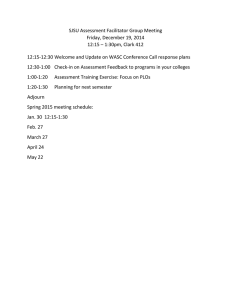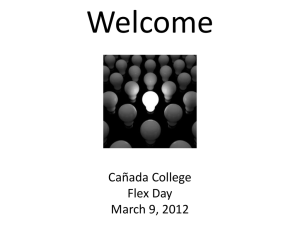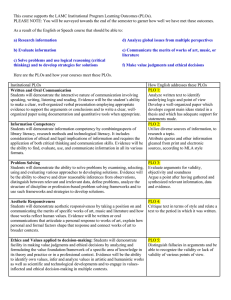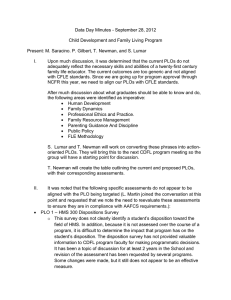SJSU Annual Program Assessment Form Academic Year 2013-2014
advertisement
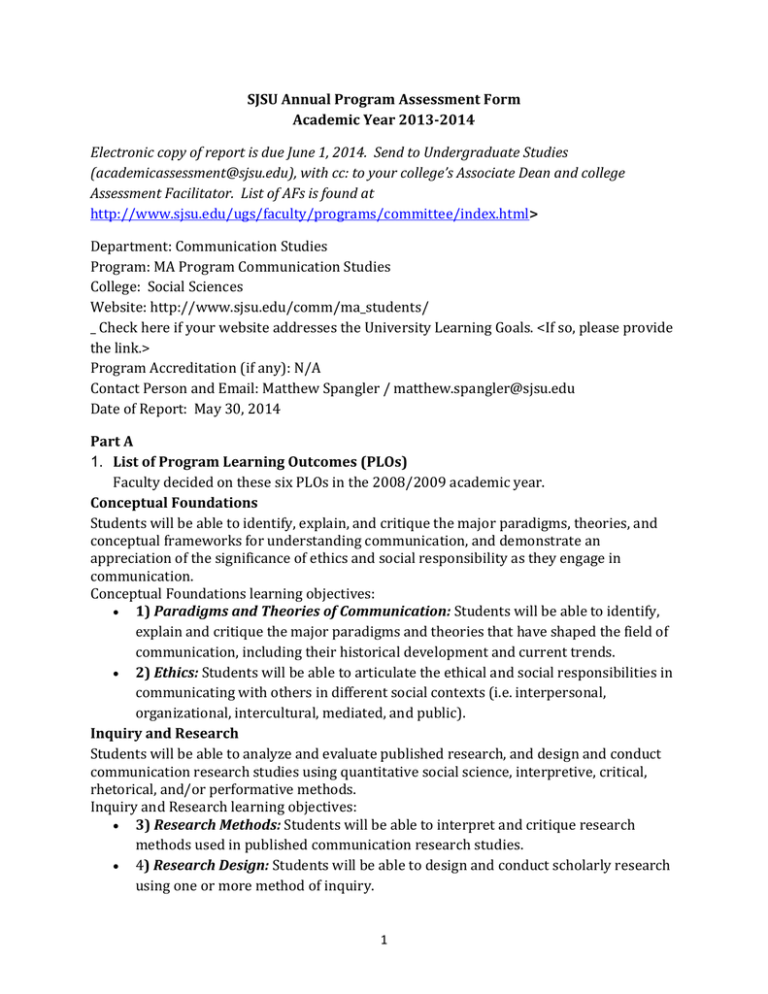
SJSU Annual Program Assessment Form Academic Year 2013-2014 Electronic copy of report is due June 1, 2014. Send to Undergraduate Studies (academicassessment@sjsu.edu), with cc: to your college’s Associate Dean and college Assessment Facilitator. List of AFs is found at http://www.sjsu.edu/ugs/faculty/programs/committee/index.html> Department: Communication Studies Program: MA Program Communication Studies College: Social Sciences Website: http://www.sjsu.edu/comm/ma_students/ _ Check here if your website addresses the University Learning Goals. <If so, please provide the link.> Program Accreditation (if any): N/A Contact Person and Email: Matthew Spangler / matthew.spangler@sjsu.edu Date of Report: May 30, 2014 Part A 1. List of Program Learning Outcomes (PLOs) Faculty decided on these six PLOs in the 2008/2009 academic year. Conceptual Foundations Students will be able to identify, explain, and critique the major paradigms, theories, and conceptual frameworks for understanding communication, and demonstrate an appreciation of the significance of ethics and social responsibility as they engage in communication. Conceptual Foundations learning objectives: 1) Paradigms and Theories of Communication: Students will be able to identify, explain and critique the major paradigms and theories that have shaped the field of communication, including their historical development and current trends. 2) Ethics: Students will be able to articulate the ethical and social responsibilities in communicating with others in different social contexts (i.e. interpersonal, organizational, intercultural, mediated, and public). Inquiry and Research Students will be able to analyze and evaluate published research, and design and conduct communication research studies using quantitative social science, interpretive, critical, rhetorical, and/or performative methods. Inquiry and Research learning objectives: 3) Research Methods: Students will be able to interpret and critique research methods used in published communication research studies. 4) Research Design: Students will be able to design and conduct scholarly research using one or more method of inquiry. 1 Professional Practice Students will be able to demonstrate advanced competency in scholarly writing, oral communication, and the application of conceptual foundations and research methods in professional contexts by designing and conducting applied communication activities. Professional Practice learning objectives: 5) Advanced Communication Competence: Students will be able to articulate indepth understanding of conceptual foundations and research methods through advanced scholarly writing and oral communication. 6) Theory and Research Applications: Students will be able to design, facilitate, and evaluate applied communication activities (i.e. presentations, workshops, forums, trainings, group discussions, etc.) in professional contexts utilizing conceptual foundations and research methods. 2. Map of PLOs to University Learning Goals (ULGs) This map was created by the Curriculum Committee in the College of Social Sciences. It was later discussed and approved by the graduate committee and faculty in the Communication Studies Department. PLO 1 (Paradigms and Theories of Communication) maps onto ULG 1 (Specialized Knowledge) PLO 2 (Ethics) maps onto ULG 5 (Social and Global Responsibilities) PLO 3 (Research Methods) maps onto ULG 3 (Intellectual Skills) PLO 4 (Research Design) maps onto ULG 2 (Broad Integrative Knowledge) PLO 5 (Advanced Communication Competence) maps onto ULG 2 (Broad Integrative Knowledge) PLO 6 (Theory and Research Applications) maps onto ULG 4 (Applied Knowledge) 3. Alignment – Matrix of PLOs to Courses All of the graduate level courses in the department address each of the six PLOs: (1) theories of communication, (2) ethics, (3) research methods, (4) research design, (5) communication competence, and (6) research applications. All six PLOs are assessed in the culminating course – Comm 297 Writing Seminar & Exams – that all students must take in their last semester in the program. 4. Planning – Assessment Schedule Starting in the fall of 2014, each of the six PLOs will be assessed two times a year in Comm 297. The course will be offered in the fall and again in the spring. In the spring of 2015, as a graduate faculty, we will look at the assessment data from the fall 2014 semester and begin a conversation about which PLOs we might more successfully teach in the department and what strategies we will use. 2 5. Student Experience The PLOs are communicated to students on the department’s website and on individual class syllabi. The ULGs are not currently communicated to students. But, starting in the fall of 2014, we plan to list the ULGs on the department website and on individual class syllabi. Part B 6. Graduation Rates for Total, Non URM and URM students (per program and degree) 7. Headcounts of program majors and new students (per program and degree) 8. SFR and average section size (per program) 9. Percentage of tenured/tenure-track instructional faculty (per department) 3 Part C 10. Closing the Loop/Recommended Actions We have a program review starting this coming fall (2014). We anticipate the program review will provide us with some specific recommended actions with regard to the MA program. 11. Assessment Data Starting in fall 2010, we created and tested a rubric for our graduate program culminating experience that assesses students’ mastery of our SLOs at the end of their graduate experience. Members of a student’s thesis, exam, or project committee complete the rubric after the student’s oral defense evaluating the student in theory, method, and written and oral communication skills. The following rubric item corresponds to SLO4: Rate the student’s understanding and execution of stated method or mode of analysis: 1) exceptional, 2) good, 3) adequate, 4) ineffective or lacking. As of the fall of 2014, we had collected evaluations for 17 exams (51 evaluations), 12 theses (35 evaluations), and 6 projects (17 evaluations) with 76 responses total to the above rubric item. Students who completed exams (rather than doing a thesis or project) had the weakest showing of the three on this item with 7 rated as “ineffective or lacking.” 43% rated projects “adequate” in the area of method while 27% rated exams and theses “adequate” in the area of method. 12. Analysis Our assessment data suggests that (1) students who complete a thesis or project tend to have a better grasp of method than do exam takers, OR (2) that our exams do not adequately assess students’ understanding of method OR (3) that our stronger students self-select into a thesis or project, whereas our weaker students self-select into the exam. In any event, we may need to revise our exam design and boost student preparation in the area of method. When the department moved to 4 unit seminars, the graduate program adopted the model of our undergraduate program with each seminar featuring a 4th “unit of engagement” that students satisfied with a specific assignment. After a review of our courses, the graduate faculty determined that a 4th unit focused on the practice of specific research methods would better serve graduate students. Seminars integrated with a 4th unit focused on methods begin in fall 2013. We also made our comprehensive exam mandatory for all students beginning fall 2013 and introduced a required research presentation as part of the exam process. These changes are designed to provide students with continuous instruction and practice in research methods, as well as the department’s other 5 PLOs. 13. Proposed changes and goals (if any) 4 Starting in the fall of 2014, the comprehensive exams will be the primary site for assessing the six PLOs. We plan to assess all six PLOs each semester (so 12 PLOs per year). All MA students will take the exams in their final semester in the program. 5
